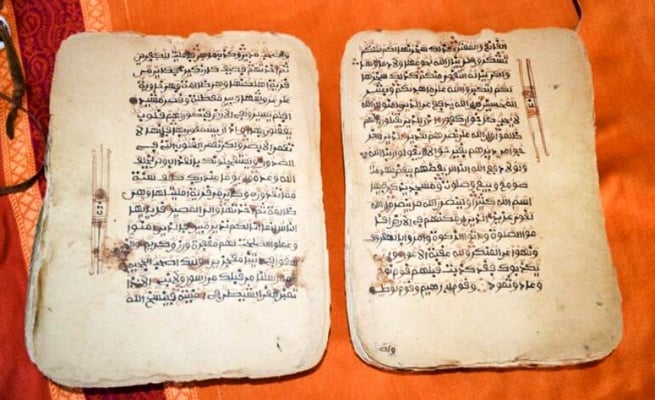From the IWK archives: 400-year-old Quran preserved in Hamilton

Dr Mustafa Farouk, a renowned meat scientist, working at AgResearch in Hamilton, has preserved Nigerian handwritten Quran manuscripts that date back to more than 400 years.
Quran is the religious book of the Muslim community that can be found in almost every Muslim house. In Nigeria, most of the old families had handwritten Qurans, and after they passed away, the book would either be burnt or buried. Old books usually start deteriorating with time and are attacked by paper mites if not preserved well.

Dr Mustafa has four old handwritten Qurans in his possession, the pages of which have turned yellow and every time opened leaves a residue of paper tatters and turns to dust where placed He also owns a couple of pens that were used to write those Qurans, sticks of guinea corn plants and a bottle of ink made from a mixture of charcoal and dyes.
Dr Mustafa collected four holy Qurans over the years on his trips to Nigeria. Most people prefer to keep the printed versions of Qurans, as the handwritten ones become challenging to maintain.
 Dr Mustafa Farouk receiving his Queen's Service Medal in 2015
Dr Mustafa Farouk receiving his Queen's Service Medal in 2015
Of the four Qurans, one is between 450 to 500 years old wrapped in an old leather bag; the second is 150 to 200 years old, the third around 70 years old and the fourth barely 50 years old. All are handwritten in ancient Arabic calligraphy.
It is said that these Qurans were written by scholars who memorised the script down to every dot and diacritic. The script was written on both sides of the paper. Scholars jumped to a new page after writing on one side of the paper to let the ink dry before returning to the other side to complete the scripture. The sacred text was written with utmost precision and accuracy.

Dr Farouk mentions that until a few decades ago, people in Nigeria mostly used handwritten Qurans to read, learn and understand. The calligraphy of the new printed Qurans is a little different from the handwritten ones, and people well-versed with the new versions have difficulty in reading the old ones.
The scientist has been labouring to preserve the books and is looking forward to keeping it open for public view. He intends to gift the Qurans to the museum that will be built inside the Islamic Centre in Auckland soon.
(This article was first published on the Indian Weekender in 2015)
Dr Mustafa Farouk, a renowned meat scientist, working at AgResearch in Hamilton, has preserved Nigerian handwritten Quran manuscripts that date back to more than 400 years.
Quran is the religious book of the Muslim community that can be found in almost every Muslim house. In Nigeria, most of the...
Dr Mustafa Farouk, a renowned meat scientist, working at AgResearch in Hamilton, has preserved Nigerian handwritten Quran manuscripts that date back to more than 400 years.
Quran is the religious book of the Muslim community that can be found in almost every Muslim house. In Nigeria, most of the old families had handwritten Qurans, and after they passed away, the book would either be burnt or buried. Old books usually start deteriorating with time and are attacked by paper mites if not preserved well.

Dr Mustafa has four old handwritten Qurans in his possession, the pages of which have turned yellow and every time opened leaves a residue of paper tatters and turns to dust where placed He also owns a couple of pens that were used to write those Qurans, sticks of guinea corn plants and a bottle of ink made from a mixture of charcoal and dyes.
Dr Mustafa collected four holy Qurans over the years on his trips to Nigeria. Most people prefer to keep the printed versions of Qurans, as the handwritten ones become challenging to maintain.
 Dr Mustafa Farouk receiving his Queen's Service Medal in 2015
Dr Mustafa Farouk receiving his Queen's Service Medal in 2015
Of the four Qurans, one is between 450 to 500 years old wrapped in an old leather bag; the second is 150 to 200 years old, the third around 70 years old and the fourth barely 50 years old. All are handwritten in ancient Arabic calligraphy.
It is said that these Qurans were written by scholars who memorised the script down to every dot and diacritic. The script was written on both sides of the paper. Scholars jumped to a new page after writing on one side of the paper to let the ink dry before returning to the other side to complete the scripture. The sacred text was written with utmost precision and accuracy.

Dr Farouk mentions that until a few decades ago, people in Nigeria mostly used handwritten Qurans to read, learn and understand. The calligraphy of the new printed Qurans is a little different from the handwritten ones, and people well-versed with the new versions have difficulty in reading the old ones.
The scientist has been labouring to preserve the books and is looking forward to keeping it open for public view. He intends to gift the Qurans to the museum that will be built inside the Islamic Centre in Auckland soon.
(This article was first published on the Indian Weekender in 2015)









Leave a Comment